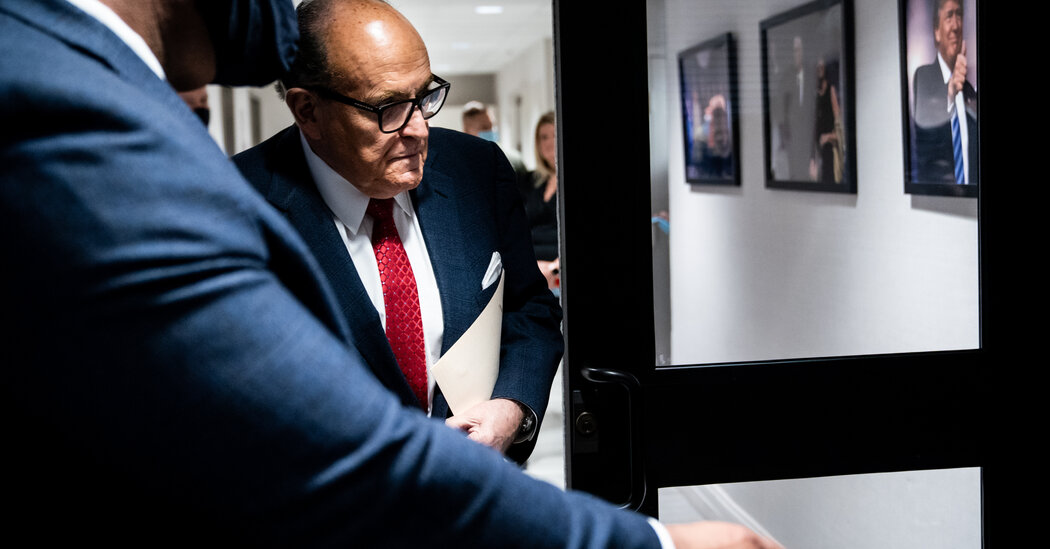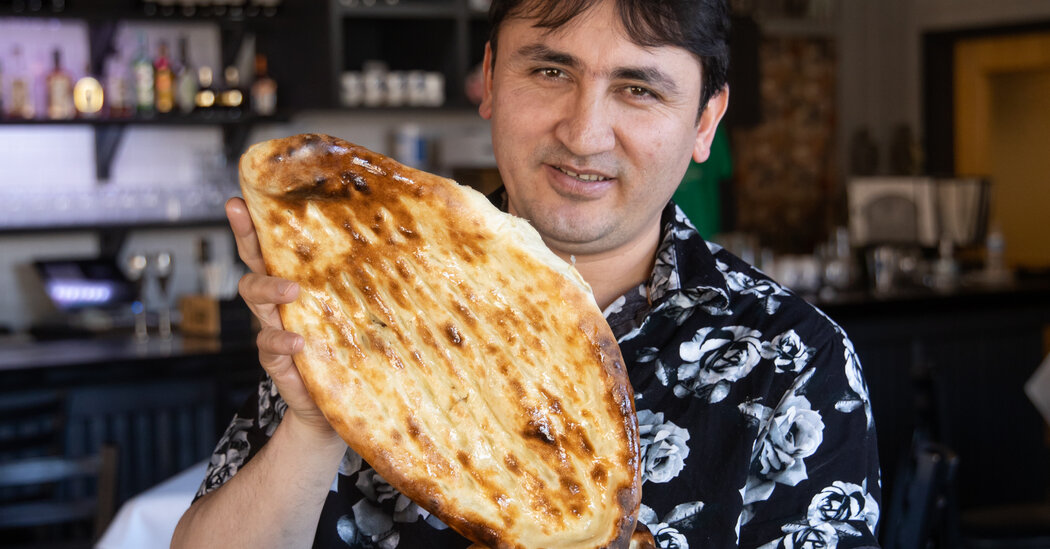
The Justice Department has stepped up its criminal investigation into the creation of alternate slates of pro-Trump electors seeking to overturn Joseph R. Biden Jr.’s victory in the 2020 election, with a particular focus on a team of lawyers that worked on behalf of President Donald J. Trump, according to people familiar with the matter.
A federal grand jury in Washington has started issuing subpoenas in recent weeks to people linked to the alternate elector plan, requesting information about several lawyers including Mr. Trump’s personal lawyer Rudolph W. Giuliani and one of his chief legal advisers, John Eastman, one of the people said.
The subpoenas also seek information on other pro-Trump lawyers like Jenna Ellis, who worked with Mr. Giuliani, and Kenneth Chesebro, who wrote memos supporting the elector scheme in the weeks after the election.
A top Justice Department official acknowledged in January that prosecutors were trying to determine whether any crimes were committed in the scheme.
Under the plan, election officials in seven key swing states put forward formal lists of pro-Trump electors to the Electoral College on the grounds that the states would be shown to have swung in favor of Mr. Trump once their claims of widespread election fraud had been accepted. Those claims were baseless, and all seven states were awarded to Mr. Biden.
It is a federal crime to knowingly submit false statements to a federal agency or agent for an undue end. The alternate elector slates were filed with a handful of government bodies, including the National Archives.
The focus on the alternate electors is only one of the efforts by the Justice Department to broaden its vast investigation of hundreds of rioters who broke into the Capitol on Jan. 6, 2021.
In the past few months, grand jury subpoenas have also been issued seeking information about a wide array of people who organized Mr. Trump’s rally near the White House that day, and about any members of the executive and legislative branches who may have taken part in planning the event or tried to obstruct the certification of the 2020 election.
The widening and intensifying Justice Department inquiry also comes as the House select committee investigating the efforts to overturn the election and the Jan. 6 assault prepares for public hearings next month.
The subpoenas in the elector investigation are the first public indications that the roles of Mr. Giuliani and other lawyers working on Mr. Trump’s behalf are of interest to federal prosecutors.
After Election Day, Mr. Giuliani and Ms. Ellis appeared in front of a handful of legislatures in contested swing states, laying out what they claimed was evidence of fraud and telling lawmakers that they had the power to pick their own electors to the Electoral College.
Mr. Eastman was an architect of a related plan to pressure Vice President Mike Pence to use the alternate electors in a bid to block or delay congressional certification of Mr. Biden’s victory.
Examining the lawyers who worked with Mr. Trump after the election edges prosecutors close to the former president. But there is no guarantee that an investigation of the lawyers working on the alternate elector plan would lead prosecutors to discover any evidence that Mr. Trump broke the law.
The plot to use alternate electors was one of the most expansive and audacious schemes in a dizzying array of efforts by Mr. Trump and his supporters to deny his election loss and keep him in the White House.
It began even before some states had finished counting ballots, as officials in places like Arizona, Georgia and Wisconsin came under pressure to create slates of electors announcing that Mr. Trump had won.
The scheme reached a crescendo in the days leading up to Jan. 6, when Mr. Trump and his allies mounted a relentless campaign to persuade Mr. Pence to accept the alternate electors and use them at a joint session of Congress to deny — or at least delay — Mr. Biden’s victory.
At various times, the plan involved state lawmakers and White House aides, though prosecutors seem to believe that a group of Mr. Trump’s lawyers played a crucial role in carrying it out. Investigators have cast a wide net for information about the lawyers, but prosecutors believe that not all of them may have supported the plans that Mr. Trump’s allies created to keep him in office, according to one of the people familiar with the matter.
Mr. Giuliani’s lawyer said he was unaware of any investigation into his client. Mr. Eastman’s lawyer and Ms. Ellis did not return emails seeking comment. Mr. Chesebro declined to answer questions about the inquiry.
The strategy of pushing the investigation forward by examining the lawyers’ roles could prove to be tricky. Prosecutors are likely to run into arguments that some — or even much — of the information they are seeking is protected by attorney-client privilege. And there is no indication that prosecutors have sought to subpoena the lawyers or search their property.
“There are heightened requirements for obtaining a search warrant on a lawyer,” said Joyce Vance, a former U.S. attorney in Alabama. “Even when opening a case where a lawyer could be a subject, prosecutors will flag that to make sure that people consider the rights of uninvolved parties.”
As a New York real estate mogul, Mr. Trump had a habit of employing lawyers to insulate himself from queries about his questionable business practices and personal behavior. In the White House — especially in times of stress or scandal — he often demanded loyalty from the lawyers around him, once asking in reference to a mentor and famous lawyer known for his ruthlessness, “Where’s my Roy Cohn?”
Some of the lawyers who have come under scrutiny in connection with the alternate elector scheme are already facing allegations of professional impropriety or misconduct.
In June, for instance, Mr. Giuliani’s law license was suspended after a New York court ruled that he had made “demonstrably false and misleading statements” while fighting the election results on Mr. Trump’s behalf. Boris Epshteyn, another lawyer who worked with Mr. Giuliani, has also come under scrutiny in the Justice Department investigation, the people familiar with the matter said.
Two months before Mr. Giuliani’s license was suspended, F.B.I. agents conducted extraordinary searches of his home and office in New York as part of an unrelated inquiry centered on his dealings in Ukraine before the 2020 election, when he sought to damage Mr. Biden’s credibility.
In March, a federal judge in California ruled in a civil case that Mr. Eastman had most likely conspired with Mr. Trump to obstruct Congress and defraud the United States by helping to devise and promote the alternate elector scheme, and by presenting plans to Mr. Pence suggesting that he could exercise his discretion over which slates of electors to accept or reject at the Jan. 6 congressional certification of votes.
The scheme, which involved holding meetings and drafting emails and memos, was “a coup in search of a legal theory,” wrote the judge, David O. Carter of the Central District of California.
It was revealed this month that Mr. Eastman was involved in a similar — but perhaps even more brazen — effort to overturn to the election results. According to emails released by a public records request, Mr. Eastman pressed a Pennsylvania state lawmaker in December 2020 to carry out a plan to strip Mr. Biden of his win in that state by essentially retabulating the vote count in a way that would favor Mr. Trump.
A week before the disclosure of Mr. Eastman’s emails, Ms. Ellis was accused of misconduct in an ethics complaint submitted to court officials in Colorado, her home state.
The complaint, by the bipartisan legal watchdog group the States United Democracy Center, said that Ms. Ellis had made “numerous public misrepresentations” while traveling the country with Mr. Giuliani after the election in an effort to persuade local lawmakers that the voting had been marred by fraud.
It also noted that Ms. Ellis had assisted Mr. Trump in an “unsuccessful and potentially criminal effort” to stave off defeat by writing two memos arguing that Mr. Pence could ignore the electoral votes in key swing states that had pledged their support to Mr. Biden.
As for Mr. Chesebro, he was involved in what may have been the earliest known effort to put on paper proposals for preparing alternate electors.
A little more than two weeks after Election Day, Mr. Chesebro sent a memo to James Troupis, a lawyer for the Trump campaign in Wisconsin, laying out a plan to name pro-Trump electors in the state. In a follow-up memo three weeks later, Mr. Chesebro expanded on the plan, setting forth an analysis of how to legally authorize alternate electors in six key swing states, including Wisconsin.
The two memos, obtained by The New York Times, were used by Mr. Giuliani and Mr. Eastman, among others, as they developed a strategy intended to pressure Mr. Pence and to exploit ambiguities in the Electoral Count Act, according to a person familiar with the matter.




